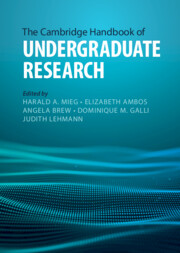Book contents
- The Cambridge Handbook of Undergraduate Research
- The Cambridge Handbook of Undergraduate Research
- Copyright page
- Contents
- Figures
- Tables
- Contributors
- Foreword
- Foreword
- 1 Introduction
- Part I Theory and Research on Undergraduate Research
- Part II Implementation, Approaches, Methods
- Part III Disciplines
- 17 Introduction
- Part III.1 STEM
- Part III.2 Health
- Part III.3 Social Sciences
- Part III.4 Humanities
- Part III.5 Arts & Design
- Part III.6 Disciplines A–Z
- 40 Undergraduate Research in Business Schools
- 41 Undergraduate Research in Early Childhood Education
- 42 Undergraduate Research in Geography
- 43 Undergraduate Research in Legal Studies
- 44 Undergraduate Research in Social Work Education
- 45 Approaches to Undergraduate Research in Sustainability
- 46 Undergraduate Research in Teacher Education
- Part IV International Perspective
- Part V Avenues for Developing Undergraduate Research
- Index
- References
40 - Undergraduate Research in Business Schools
from Part III.6 - Disciplines A–Z
Published online by Cambridge University Press: 11 August 2022
- The Cambridge Handbook of Undergraduate Research
- The Cambridge Handbook of Undergraduate Research
- Copyright page
- Contents
- Figures
- Tables
- Contributors
- Foreword
- Foreword
- 1 Introduction
- Part I Theory and Research on Undergraduate Research
- Part II Implementation, Approaches, Methods
- Part III Disciplines
- 17 Introduction
- Part III.1 STEM
- Part III.2 Health
- Part III.3 Social Sciences
- Part III.4 Humanities
- Part III.5 Arts & Design
- Part III.6 Disciplines A–Z
- 40 Undergraduate Research in Business Schools
- 41 Undergraduate Research in Early Childhood Education
- 42 Undergraduate Research in Geography
- 43 Undergraduate Research in Legal Studies
- 44 Undergraduate Research in Social Work Education
- 45 Approaches to Undergraduate Research in Sustainability
- 46 Undergraduate Research in Teacher Education
- Part IV International Perspective
- Part V Avenues for Developing Undergraduate Research
- Index
- References
Summary
While there has been much discussion around the role of academics and practitioners, there has been a surprising absence of how undergraduate students play an important role in the nexus of research, teaching, and impact. The chapter describes six vignettes from Australia, Malaysia, the UK, and the US to show how programs and activities can provide research training, transferable skills, and status for undergraduate students, as well as valuable insights for people, organizations, society, and the environment. The chapter explains how students can use research for academic and practical impact. The examples also demonstrate how high-quality undergraduate research within business schools can productively inform thinking, behavior, and decision making outside of universities.
Keywords
- Type
- Chapter
- Information
- The Cambridge Handbook of Undergraduate Research , pp. 381 - 389Publisher: Cambridge University PressPrint publication year: 2022

